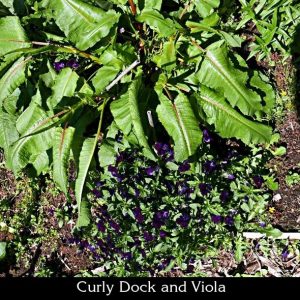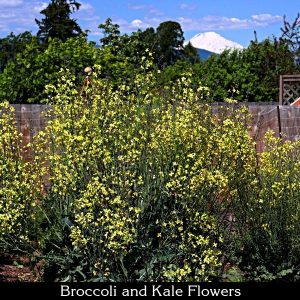By Andy Wade –
For everything there is a season, a time for every activity under heaven. Ecclesiastes 3:1 (NLT)
It’s May and my backyard is a mess! Normally I’d be much further along with my garden adventures by now, but this year life has been much more chaotic than normal. I did get most of my seed starts going on time. Keeping them watered and healthy was a bit of a challenge, but they’re now ready to be planted.
[themify_box style=”light-green, rounded, shadow” ]Can we learn about our approach to neighborhoods and communities from how we approach the garden? I think we can![/themify_box]
 The interesting thing I’m learning this year is that, even when life gets crazy-busy, timing is everything. As my garden went largely neglected, winter broccoli and kale began to flower and started to produce seed. And the dock (in the buckwheat family but considered a weed) is everywhere, sending its tap roots deep into the soil. My temptation is to rush out there and start ripping out the old and planting the new. It’s spring, after all; it’s time for my garden to look organized and productive!
The interesting thing I’m learning this year is that, even when life gets crazy-busy, timing is everything. As my garden went largely neglected, winter broccoli and kale began to flower and started to produce seed. And the dock (in the buckwheat family but considered a weed) is everywhere, sending its tap roots deep into the soil. My temptation is to rush out there and start ripping out the old and planting the new. It’s spring, after all; it’s time for my garden to look organized and productive!
But while the garden looks a mess, something spectacular is going on. Flowers on the broccoli and kale are attracting hordes of bees to the garden. Although my spring plants are not yet in the ground, these late winter bloomers are creating a healthy home for pollinators and other critters essential for the health and vitality of the garden that is yet to emerge. Not only this, but because I’m letting it go to seed, I can save the seed from these heirloom and organic wonders for planting next year.
And that dock? While I pull or cut it back before it sets seed (it spreads like, well, a weed, but if you’re willing to risk that, I’m told the grain can be used as a coffee substitute), the young leaves are tasty and those annoying tap roots actually draw to the surface and make available nutrients trapped deep underground. That’s right, even these tenacious trespassers can be a profound asset.
[themify_box style=”light-green, rounded, shadow” ]Similar to sorrel, beet greens, chard and rhubarb, dock contains oxalic acid (rhubarb leaves contain so much that they are toxic!). This substance makes docks taste sour, kind of lemony. Oxalic acid can be potentially harmful if taken in large quantity. Cooking decreases the amount of oxalic acid. Plants for a Future notes: “People with a tendency to rheumatism, arthritis, gout, kidney stones or hyperacidity should take especial caution if including this plant in their diet since it can aggravate their condition. Avoid during pregnancy & breast feeding.”[/themify_box]
In my post last week, See the Wonder, I explored our need to go deep below the surface symptoms in our communities to discover the people, the imago dei, behind them. So much damage can be caused by focusing on symptoms and issues ahead of the people behind them. In a similar manner, in our eagerness to get busy and “fix things”, we might not only hurt the individuals behind them, we might also destroy community networks that help an area thrive, or at least survive, when times get tough.
Like the dock in my garden, community networks often run deep, wide, and lie largely unseen. Without taking time to listen, watch, and interact, we can easily miss how these deep networks actually provide nutrients that can make the neighborhood healthy. In our rush to rip out the “weeds” we can easily destroy important networks for feeding the community in the future. Learning to identify and understand not just individual issues in the neighborhood, but also the essential networks that lie underneath, can be one of the most important things that we do.
 While I don’t want the dock to go to seed because it creates a mess in the garden, the broccoli and kale are a whole different story. These plants, have reached maturity. The natural thing to do is to admit that there’s no more produce to be extracted from these plants so it’s time to send them to the compost heap.
While I don’t want the dock to go to seed because it creates a mess in the garden, the broccoli and kale are a whole different story. These plants, have reached maturity. The natural thing to do is to admit that there’s no more produce to be extracted from these plants so it’s time to send them to the compost heap.
This is often our knee-jerk reaction to out-dated and older programs and institutions in our communities. There are certainly times when sending them to the compost heap is the right move. But sometimes these dying programs and institutions have one more thing to offer – seeds for a future endeavor.
Unlike my heirloom and organic seed, which I want to produce plants identical to their “parent”, the seeds we’re looking for from past-the-due-date programs and organizations are those that bring with them best practices, connections, and insights that assist in bringing forth new fruit for changing times. When we yank them out too quickly we risk losing hard-earned lessons of the past.
The Lesson
Delay is not always a bad thing. Sometimes, like with my garden, it forces us to slow down, to remember what it’s really all about, and to stay on track. Intentional delay can help us to listen more fully and learn more deeply of the places we inhabit, which makes us better community members and our actions more effective over the long run.
My challenge for the week: Find a place where you can sit and listen, watch, and wonder.
-
How might God be present even in programs and institutions you thought were long past their expiration date?
-
What “seeds” might be present within those programs and institutions that might actually be beneficial moving into the future?
-
As you observe the interactions between people and the flow of local trade and communication, what networks do you see that you didn’t notice before?
-
What “nutrients” might be deep within your community and how are they currently being “drawn to the surface” and made available?
-
With all of this in mind, are there things you may have been too quick to discount or ignore as irrelevant that might actually be important for the future of your place?
